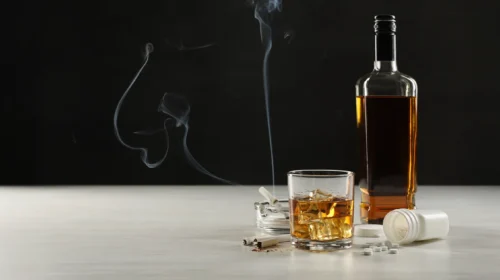Sexual health and addiction are closely linked. The elevated health risks and behaviors of substance use disorder (SUD) often directly coincide with those of sexually transmitted diseases (STDs). Understanding the connection between these two sets of risks can help you or your loved one more safely manage your overall health as you look for treatment for drugs or alcohol.
How Can Drug and Alcohol Abuse Impact Sexual Health?
In the simplest terms, alcohol and drug abuse lowers inhibitions and makes users more likely to engage in high-risk sexual behavior, like unprotected intercourse and sexual activity with strangers.
The relationship between substance use and poor sexual health affects individuals in practically every age group, including juvenile users: Data from the Centers for Disease Control and Prevention (CDC) indicates that:
- 19 percent of high school students drank alcohol or used drugs before their last sexual intercourse.
- 29 percent of high school students are currently sexually active
- 40 percent of high school students have ever had intercourse
Injection drug users are particularly vulnerable to sexually transmitted diseases. Data from the CDC published by the National Institute on Drug Abuse (NIDA) indicates injection drug use (IDU) contributes to nearly 20 percent of recorded HIV cases among men. The CDC also reports:
- Excessive drinking can be a crucial risk factor for HIV because it is linked to risky sexual behaviors and, among people living with HIV, can hurt treatment outcomes.
- Opioids are often associated with HIV risk behaviors, such as needle sharing when infected and risky sex, and have been linked to a recent HIV outbreak.
- Methamphetamine (meth) is associated with risky sexual behavior that places people at greater HIV risk. It can be injected, which also increases HIV risk if people share needles and other injection equipment.
- Crack and powder cocaine can create a cycle in which people quickly exhaust their resources and turn to other ways to get the drug, including trading sex for drugs or money, which increases HIV risk.
- Inhalants are commonly linked to risky sexual behaviors, illegal drug use, and sexually transmitted diseases among gay and bisexual men.
A 2019 study published by the CDC also found that meth, heroin and different types of injection drug use contribute to higher rates of primary and secondary syphilis.
What Drives Poor Sexual Health in Addiction?
There are many factors that lead to high-risk sexual behavior during active drug and alcohol abuse, including but not limited to:
- Intimacy to Cope with Depression and Anxiety – There are times when the only thing that makes sense to us is a physical connection with someone else. It makes life feel somewhat normal in periods of dysfunction, like those experienced during addiction. Drug and alcohol abuse takes an emotional toll, which can lead users to crave intimacy to feel normal, loved and valued when they need it most.
- Engaging in Sexual Behavior for Drugs or Alcohol – Unfortunately, there are many instances in which people may exchange sexual favors to procure drugs or alcohol. This doesn’t have to be as overt as someone literally engaging in a pre-established quid pro quo. It can be something simple as “bonding” with someone over drinking or casual drug use.
- Poor Sexual and Drug Use Hygiene – One of the primary reasons why injection drug users are so vulnerable to STDs is because they often share dirty or contaminated needles with people who are infected. This is common among users with serious dependency who either may not be cognizant of what they’re doing or are suffering from serious withdrawal symptoms.
It’s also common to experience co-occurring sex addiction and substance use disorder, in which case they may need dual-diagnosis treatment to address the symptoms, origins and sustaining factors.
Practicing Safe Sex Before and during Recovery
While the pursuit of addiction treatment and recovery can be an ongoing endeavor, there are certain measures you can take to reduce your risk of poor sexual health outcomes as you look for help:
- Use condoms, IUDs, medication or other types of contraception to prevent unwanted pregnancy and sexually transmitted diseases.
- Get tested regularly, before and after being intimate with a new partner, to have a clear and full picture of your sexual health.
- Vet any potential partners to ensure that they’re sexually healthy. Ask them when they were last tested. If they’ve had sex since their last partner, ask that they get tested again before engaging in sexual acts.
It’s important to realize that you can get STDs from sexual acts other than intercourse. Common types of STDs include:
- Syphilis (Curable)
- Gonorrhea (Curable)
- Chlamydia (Curable)
- Trichomoniasis (Curable)
- Hepatitis B
- Herpes Simplex Virus (HSV or Herpes)
- HIV/AIDS
- Human Papillomavirus (HPV)
While the last four sexually transmitted infections on this list are not definitively curable, they can be managed and monitored to maximize your health and long-term quality of life. Work with your doctor to form a game plan.
LGBTQ+ Sexual Health and SUD
The LGBTQ+ community experiences unique sexual health issues. These factors can both cause and affect the formation of substance use disorder and are often compounded by gaps in healthcare. Identity issues, trauma, stigma, and institutional barriers to treatment can lead to higher rates of both SUD and sexual health issues. It can be hard to unravel the relationship between these two sets of health issues, and the external factors that lead to them. Recovery Unplugged offers specialized LGBTQ+ addiction treatment to help this community find peace of mind and lasting recovery from alcohol and drug addiction in a safe, supportive environment.
Get Treatment for Substance to Preserve Your Sexual Health
The most effective way you can stop addiction from impacting your sexual health is by getting treatment for your substance use disorder. Alcohol and drug treatment improve and stabilize every part of your life, including your sexual health and ability to cultivate healthy relationships. In treatment, you or your loved one can get medical help and insights from doctors about proper sexual health and expert care for any existing sexually transmitted infections. You will also get help from a mental health expert to explore any unhealthy sexual decision-making that led to your substance and how to cultivate healthy and functional romantic relationships.
Recovery Unplugged offers addiction treatment in Florida, Texas, Nashville, and Northern Virginia to help you or your loved one overcome substance use disorder. We are in-network with most major insurance companies and offer all levels of care, including medical detox and withdrawal management. Don’t let addiction lead to poor sexual health. Recovery Unplugged is ready to provide intuitive, compassionate, and effective care to help you explore how your sexual behavior has led to drug and alcohol abuse and develop healthy behavioral coping mechanisms in recovery.

























